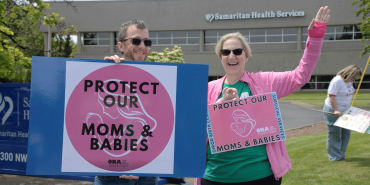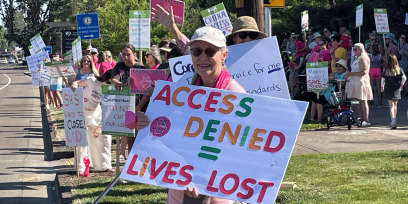Communities in the small Oregon towns of Lebanon and Lincoln City are breathing a sigh of relief after the news that Samaritan Health Services reversed course and will keep labor and delivery, and emergency surgical services open at Samaritan Lebanon Community Hospital and Samaritan North Lincoln Hospital.
The decision to preserve these critical healthcare services comes after a months-long campaign led by nurses represented by the Oregon Nurses Association. The nurses say this is a victory for their entire community—especially for patients. They are deeply grateful to everyone who wrote letters, signed petitions, attended rallies and marched with them. The nurses’ voices made the difference. The campaign included protests, petitions, rallies, and pressure from the ONA, patients, families, community activists, and elected leaders at every level.
From the beginning, nurses and families made it clear these birth centers are irreplaceable and must be saved, especially for the rural communities filled with generations of families who got their start at these facilities and where the closest hospital is many miles—and sometimes hours—away. The victory means mothers, babies and families will continue to have access to safe, local care.
“The victory means a lot to the nurses,” says RN and ONA member Stefanie McDougal. “When we’re talking about a mom bleeding or a baby not getting oxygen, every minute matters. Here, we provide not only emergency care, but a cocoon of care that generations of families have relied on. Our hospital is a small local place where we provide a more personal feel, so they feel seen, safe and soothed in their birthing experience, and carry that with them for life.”
A grassroots campaign
ONA members from the Samaritan Health Services system spearheaded the community push to save family birth centers and emergency surgical facilities. Community supporters sent over 21,000 emails to Samaritan executives and board members, urging them to save local birth facilities and the emergency surgery team. The nurses were joined by doctors, patients, firefighters, and local and national elected officials, including U.S. Sens. Jeff Merkley and Ron Wyden and U.S. Rep. Val Hoyle, who publicly called on Samaritan Health Services to ensure full access to labor and delivery services for rural and coastal Oregonians.
The campaign pushed back against a troubling national trend. Over 500 hospitals in the United States have closed their labor and delivery departments since 2010. Since 2019, Oregon health systems have closed birth centers in Redmond, Baker City, Gresham and, most recently, Providence Seaside Hospital. Public health experts warn that the closures contribute to rising maternal mortality rates, especially in rural areas.
But McDougal and her colleagues say the victory in Lebanon and Lincoln City offers a different blueprint—one where nurses, patients and communities demand a seat at the table.
McDougal is hopeful this victory may be the start of a trend where people realize how important access to care is in rural communities. According to the ONA, the programs on the chopping block would have been cut without this campaign, noting that hospitals often cite costs, because birthing centers make less money than other parts of the hospital. But, says the ONA, there is another way to look at it: Birth centers create a bond with families and communities that will carry over and lead to generations of care.
She notes that there is a lot of data that shows how important it is to have access to care in rural communities, and studies have shown that when places close birth centers, fewer people begin moving in, and those are usually younger families who are going to have an economic impact on the area for a long time.
“Yes, hospitals have financial pressures,” McDougal says. “But birthing centers are community anchors. They build lifelong bonds with families who keep coming back for care.”
Looking ahead
Even as they celebrate, nurses know the fight isn’t over. Rural hospitals remain under financial strain, and federal cuts to Medicaid threaten to make things worse. ONA members are already working with community leaders to explore alternative funding streams to keep services sustainable.
For now, though, Lebanon and Lincoln City are celebrating a meaningful win. Families will continue to welcome new life close to home, in the same hospital rooms where generations before them began their stories.
“I was in shock when we found out about the victory,” McDougal admits. “But this proves what’s possible when communities stand together. It’s a reminder that our voices matter, and they saved lives.”
[Adrienne Coles]



